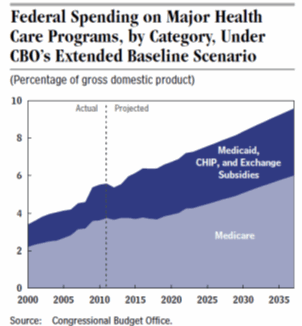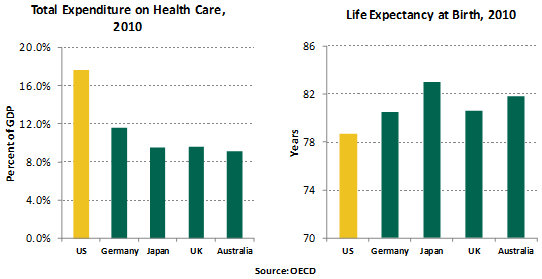The Election and the Economy
Among my earliest childhood memories involves my father taking me with him to vote. At first, I was reluctant to go. The polling place was in my grade school, which had been closed for the day. Going to school on my day off was not my idea of fun; plus, the booths were housed in the gymnasium, where my PE teacher thought it was a good idea to use me for target practice in order to demonstrate dodge ball. I still cringe just thinking about it.
But my father was insistent. Voting was very important, he told me. It’s among the things our Founding Fathers fought for. The atmosphere in the room was heavy with a sense of civic duty. So, whatever your views, please take a moment to express them; only 57% of America’s registered voters cast ballots in 2008.
There are certainly many economic issues that bear on the current election. Following are the topics that have come up most frequently in conversations with clients, and the posture of the major candidates on each of them.
What’s going to happen to the tax code?
The new Administration will not have much of a honeymoon period.
The “fiscal cliff” will need to be addressed almost immediately
after the election. Beyond that, there are broader issues
to tackle. Below is a summary of the candidates’
positions:
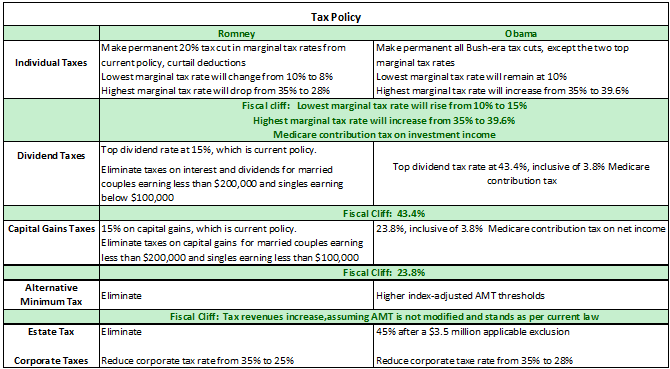
As we have written, we expect a set of short-term measures to
avert the immediate consequences of the “cliff” and another set
to address long term fiscal issues. Assuming the White
House and the Congress are not controlled by the same party (the
outcome currently reflected in market-based polls), there will
be some horse trading on the way forward for taxes and spending.
A model could be the “grand bargain” that Representative Boehner
and President Obama nearly agreed upon in the summer of 2011, or
the recommendations
of the Simpson-Bowles Commission.
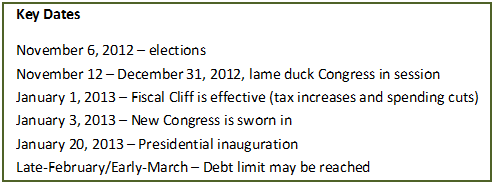
Economic advisors to the two campaigns agree that incentives to
invest must be preserved, as they promote activity that helps
the economy grow. It is therefore unlikely that dividend
and capital gains rates will be allowed to revert to 2001
levels.
Next year will mark the 100th anniversary of the Federal income tax. (Anyone want to volunteer to lead the celebration of this centennial?) Sometime during that century, our tax system morphed from a simple revenue-raising device to a tool that encourages a wide range of economic activity. The associated rise in complexity has both sides calling for broad reform.
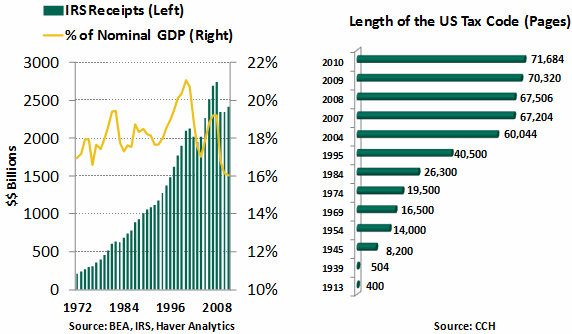
The IRS Tax Advocate estimates that the cost of complying with
the tax code is $163 billion annually, or almost 7% of aggregate
tax receipts. But when surveyed, taxpayers regularly
retreat from their support of lower and simpler tax rates if it
means giving up their favorite deductions. Reconciling
conflicting aims like this will require a measure of realism on
the part of both voters and legislators.
What’s to be done about medical care?
Our national discussion over medical care will certainly need to continue. The cost of care to patients, private providers, and government has escalated at a rapid rate, and this trend is expected to continue far into the future. Baby boomers are entering a phase of life where they will be seeing doctors more often, and the inflation rate for medical goods and services is many times the rate of overall inflation.
Apart from their outsized impact on the Federal budget, health care expenses have become an important factor in hiring decisions, and represent an important devotion of the nation’s capital that some think would be better employed elsewhere.
Governor Romney has vowed to repeal the Affordable Care Act,
and plans to replace the current Medicare program with a premium
support program (using vouchers) indexed to overall inflation.
Under this plan, beneficiaries can choose among competing plans
but the voucher would be a fixed amount. If they choose a
plan that exceeds the premium support, they would have to pay
the additional premium themselves. This differs from the
current Medicare system where beneficiaries pay the same
premium.
People who are at least 55 years old would be exempt from the
new system, and premiums would be indexed to the consumer price
index. The fact that health care costs have, in recent years,
grown faster than overall inflation may limit the appeal of this
proposal.
Medicare will retain most of its current features if President Obama is re-elected. The Affordable Care Act passed in 2010 aims to reduce Medicare spending largely by reducing payments to providers and Medical Advantage plans. As a result of this legislation, Medicare spending per beneficiary is projected to grow at a slower pace than private sector health insurance spending, which in turn would increase the solvency of the Medicare Trust Fund by a few years.
Broader reform must aim to improve the cost/benefit dynamic of the US medical system. While we spend considerably more of our GDP on this sector than other countries, our results (as measured by life expectancy, the incidence of certain diseases, etc.) are actually somewhat worse.
Further, there exist significant differences in expenses and outcomes within the United States. These regional disparities would be worthy of investigation by those seeking to contain costs.
The impact of aging on Social Security receives a lot of attention, but that system is in very manageable condition. Medical care has the potential to be far more expensive, and have a far more significant impact on economic activity. Reform will involve difficult discussions, but they should not be deferred any longer.
What are the main differences between the two candidates with regard to international trade?
Recession tends to place a spotlight on trade flows, as nations consider protections and promotions as a means of improving their domestic performance. These steps often prompt retaliation, which can leave all of the affected economies worse off.
Both Presidential candidates are supportive of forging better trade relations with the various trading partners of the United States. The Obama administration has taken the initiative to pursue the Trans-Pacific Partnership, while Governor Romney has expressed interest in completion of this negotiation. The current administration is also engaged in the possibility of free trade with the European Union (EU). Governor Romney has also indicated interest in not only a bilateral deal with the EU but also to extend the umbrella to multilateral trade agreements among nations committed to free trade.
China is the major source of contention in the trade arena, as the US trade deficit vis-à-vis China has swollen in the past two decades. The Obama administration has created a new trade enforcement agency to ensure China and other members of the WTO follow rules. In Governor Romney’s opinion, the Obama administration has failed to adopt a sufficiently aggressive stance, and he has promised to bring a “fresh and fearless” approach.
China’s exchange rate is another aspect that grabs headlines. Governor Romney has indicated he would declare China as a currency manipulator and would allow the Commerce Department to impose duties on Chinese imports if the Chinese authorities continue to undervalue the currency. The Obama administration considered this but eventually rejected it, offering instead a diplomatic suggestion that appreciation of the yuan would be preferable. Our reliance on China to finance our fiscal deficit may temper the zeal with which we pursue redress.
Will the outcome of the Presidential election have a significant impact on our economy?
While the candidates would certainly have us believe that the path to prosperity runs through the White House, their power over the business cycle will be limited.
Congress will certainly have a lot to say about the course of fiscal policy. With a very few exceptions, the House and Senate are not in complete alignment with the President. Proposals made on the campaign trail can look very different after they come through the legislature…if they make it through the legislature at all.
Further, the President has relatively little control over monetary policy. (Although the new Administration will have an opportunity to appoint several Federal Reserve Governors, as we discussed last month.) As well, the global nature of business and investing means that decisions made in foreign capitals have a bearing on the performance of the American economy. Industrial policy, trade policy, and currency policy are not within our complete control.
The President can, however, set a tone that influences the psychology of economic actors. After focusing our attention on the nation’s problems during the campaign, the victor will have to quickly turn to bolstering the nation’s sentiment.
While all elections are important, this one is occurring at a particularly delicate economic juncture. The issues in front of us require more than just a Band-Aid. Lasting solutions are needed.
Keeping up my dad’s tradition, I’ll be bringing my youngest with me next Tuesday. Apart from teaching her a civics lesson, I’ll hope to explain to her that the choices our nation makes next week could have a very important impact on her life. I therefore hope that those choices are good ones.
![]()
To subscribe or visit go to: http://www.riskcenter.com
